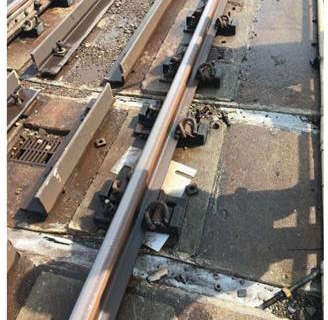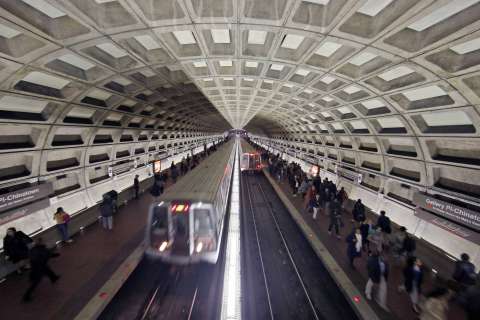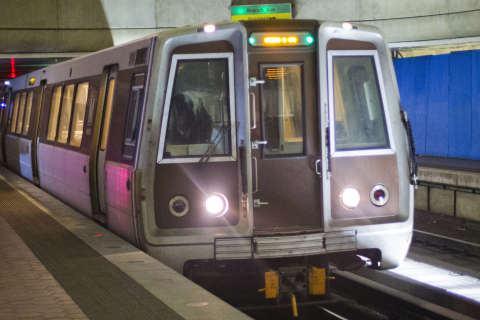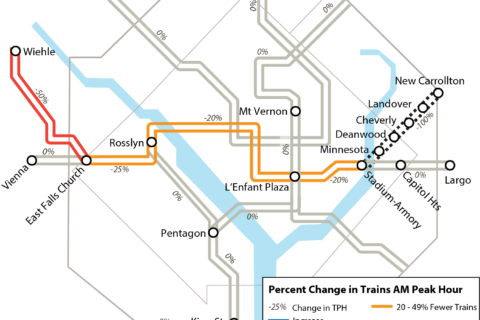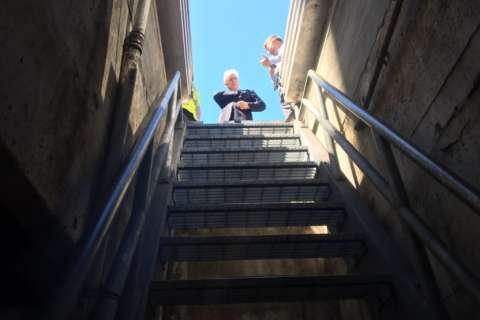WASHINGTON — Metro is set to pivot toward even greater weekend track work disruptions, as the transit agency aims to cut down on weeknight work, according to documents prepared for the Metro Board.
Metro has already announced three more shutdowns over the next year in addition to the ongoing Orange Line shutdown and an upcoming Red Line shutdown. But there is much more work on tap elsewhere in the system, Metro’s leaders said.
Among major projects planned through next June, Metro needs to fix structural issues at Rhode Island Avenue, repair drainage pumps, improve station platforms, fix lighting issues, and continue to clean up leaks and clogged drains on the Red Line.
Metro also plans to replace key parts of the tracks on the Yellow Line bridge over the Potomac, the Blue and Yellow Line tracks near Reagan National Airport, and the Blue, Orange and Silver Line tunnel between Foggy Bottom and Rosslyn.
While Metro is still finalizing initial schedules for much of the work, the board documents said the timing of disruptions is going to be scheduled based on:
1. Fencing off high passenger volume times, such as the Cherry Blossom Festival
2. Maximizing weekend work to take advantage of longer work windows and avoid disrupting rush-hour commutes
3. Reducing the number of track outages necessary by coordinating work within the same outage (“piggybacking”) where safe and efficient
4. Limiting daytime work done during the week, including midday work (10 a.m.- 2 p.m.) and evening single tracking (8 p.m.)
5. Planning strategic extended outages, where benefits gained in terms of efficiency or quality of the work warrant extended track time beyond a 3-day weekend.”
While there would still be some weeknight single-tracking to deal with water or track issues, the focus would be weekend single-tracking and shutdowns, according to the documents.
Metro plans at least 120 weekend track work disruptions between July 1 and June 30 of next year. That’s in addition to three planned two-week round-the-clock shutdowns on the Red, Green and Yellow Lines.
The plans disclose that in addition to the closure of the Branch Avenue and Suitland stations from Aug. 5-20, Naylor Road will be closed on the weekends during that 15-day shutdown.
Preventive maintenance will take awhile
As Metro cuts rail service hours on June 25, the agency has promised to do more preventive maintenance work. However, most of those six power testing, track maintenance and track cleaning programs will take three to six years to go through the entire system for the first time, revised plans to be presented to the Metro Board Thursday show.
Metro aims to at least show some progress on reducing smoke and fire incidents and track issues within a year.
The transit agency touts progress over the past year already, which it credits to track work surges and other maintenance efforts.
New preventive maintenance testing and repairs are estimated to cost $21.4 million in the first full year.
“There is some risk that the first pass of the system could create additional corrective maintenance, triggering additional costs,” Metro staff told the board.
That additional maintenance could also trigger additional delays for riders until any issue is addressed.
For example, Metro plans to test existing high voltage power cables and the areas where negative current returns for the first time in years. A majority of the traction power cables run in tubes or are otherwise hidden from visual inspections, so there is no other way to note any issues.

